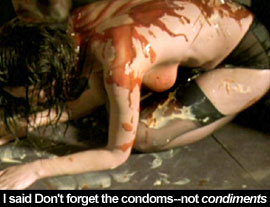YOUNG ADAM
**½/****
starring Ewan McGregor, Tilda Swinton, Peter Mullan, Emily Mortimer
screenplay by David Mackenzie, based on the novel by Alexander Trocchi
directed by David Mackenzie
Qian xi man po
****/****
starring Shu Qi, Jack Kao, Tuan Chun-hao, Chen Yi-Hsuan
screenplay by Chu T'ien-wen
directed by Hou Hsiao-hsien
Choses secrètes
***½/****
starring Coralie Revel, Sabrina Seyvecou, Roger Mirmont, Fabrice Deville
written and directed by Jean-Claude Brisseau
 by Walter Chaw David Mackenzie's Young Adam opens with a shot from below of a duck paddling placidly along the surface of a lake that's replaced by a woman's corpse, then replaced by a filthy barge-worker and his mate fishing the cadaver out with a gaffing hook. Young Adam is a beautiful picture, really, its interiors sepia-tinged like a cameo photograph and its exteriors bleached and desperate, and as a film about surfaces, it marches to its own logic with the dyspeptic malaise, if not the consistent nihilistic poetry, of a Kiyoshi Kurosawa. Surfaces include skin, of course, and a scene where tattooed Les (Peter Mullan) washes his hired help Joe (Ewan McGregor) is as blandly erotic as a scene where Joe performs cunnilingus on Les's wife Ella (Tilda Swinton), an act that wins him the fried egg he was denied at breakfast. Consumption suggesting sustenance seeps into a scene where Joe covers his girlfriend, Cathie (Emily Mortimer), with custard, ketchup, and mustard before caning and raping her. Joe's furnace is unquenchable: as Biblical doppelganger, his carnal curiosity is constantly stoked by the invitation of moribund English housewives and widows–and his ire is only aroused when an appropriate mate choice threatens to free him from his fleshy fixations. Young Adam is about being trapped and listless, about the lost generation afflicted by a plague of ennui–paddling in a circle, floating between updrafts in the widening gyre.
by Walter Chaw David Mackenzie's Young Adam opens with a shot from below of a duck paddling placidly along the surface of a lake that's replaced by a woman's corpse, then replaced by a filthy barge-worker and his mate fishing the cadaver out with a gaffing hook. Young Adam is a beautiful picture, really, its interiors sepia-tinged like a cameo photograph and its exteriors bleached and desperate, and as a film about surfaces, it marches to its own logic with the dyspeptic malaise, if not the consistent nihilistic poetry, of a Kiyoshi Kurosawa. Surfaces include skin, of course, and a scene where tattooed Les (Peter Mullan) washes his hired help Joe (Ewan McGregor) is as blandly erotic as a scene where Joe performs cunnilingus on Les's wife Ella (Tilda Swinton), an act that wins him the fried egg he was denied at breakfast. Consumption suggesting sustenance seeps into a scene where Joe covers his girlfriend, Cathie (Emily Mortimer), with custard, ketchup, and mustard before caning and raping her. Joe's furnace is unquenchable: as Biblical doppelganger, his carnal curiosity is constantly stoked by the invitation of moribund English housewives and widows–and his ire is only aroused when an appropriate mate choice threatens to free him from his fleshy fixations. Young Adam is about being trapped and listless, about the lost generation afflicted by a plague of ennui–paddling in a circle, floating between updrafts in the widening gyre.

 by Walter Chaw
by Walter Chaw by Walter Chaw
by Walter Chaw